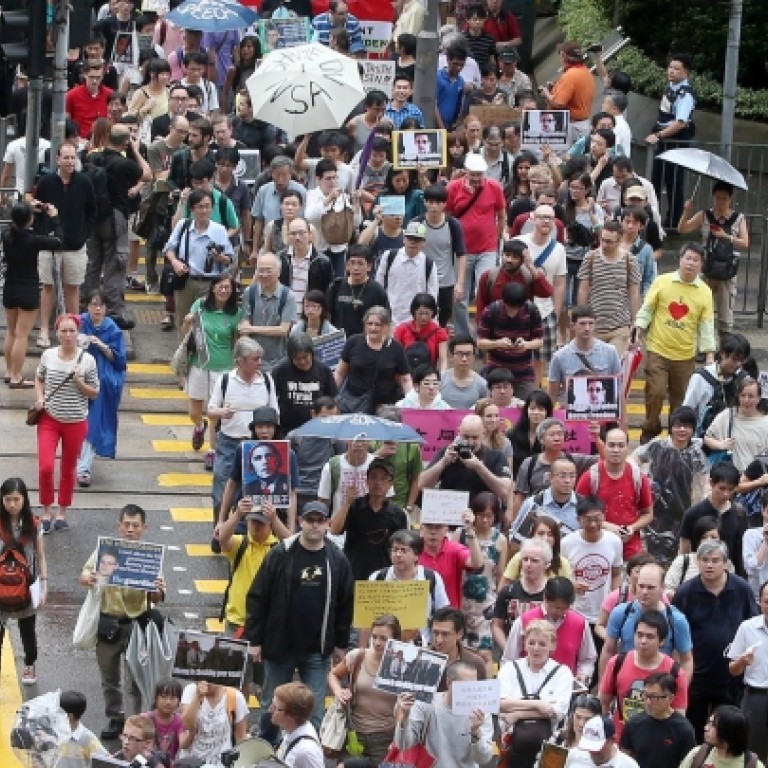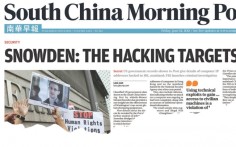
Marchers turn out to support Edward Snowden
Expats at forefront as hundreds join march in support of NSA leaker, saying he did the right thing and may not get a fair trial if sent home
Hundreds of protesters marched to the US consulate and the Hong Kong government headquarters in support of Edward Snowden yesterday, saying the American National Security Agency whistle-blower had done the right thing and should be protected.
Chanting slogans such as "NSA has no say", they held placards that read "No big brother state". Organisers from the 27 local groups taking part said 900 people had joined the procession from Chater Garden in Central, while police said the number peaked at 300.

They were joined by dozens of journalists and camera crews from around the world.
The protesters handed petitions to representatives of the consulate and the Hong Kong government and heard speeches from activists and pan-democratic lawmakers.
Earlier, eight members of the Democratic Alliance for the Betterment and Progress of Hong Kong took part in a separate march to the consulate, demanding Washington explain the hacking of computers in Hong Kong revealed by Snowden.
A DAB petition said the US should immediately destroy all information obtained without the public's knowledge.
The consulate had "no comment" on the protesters' demands. But Nini Forino, director of the consulate's public affairs section, did say: "We support Hong Kong's well-established tradition of respect for internationally recognised fundamental freedoms, including freedom of assembly, free speech and freedom of the press."
Many of the participants in the afternoon march were expatriates, including three Americans studying in the city. They described Snowden as brave.
"It's a huge breach of privacy," one said of the massive surveillance operation revealed by Snowden. "He could be risking his own life, but he was still willing to do so."
Mary Stickley, a teacher and archaeologist from Ireland, said yesterday's protest was her "first ever march".
"All governments are doing this to a certain extent, but this is critical," she said, adding that the US surveillance programme was against democracy. She said Hong Kong should not extradite Snowden to the US.
Darren Jopling, 39, was marching with his two daughters, aged eight and three. He believed Snowden had picked the right place to come out due to its well established judicial system.
A University of Hong Kong student from India said: "Even though I am not American, I still have to worry about America leaking into my private life."
She said Snowden, whether he was a hero or not, should have the right to release information in the public interest.
Another HKU student, Michelle Wong Zoi-lan, 19, said she was worried whether Snowden would get a fair extradition hearing in the city, since there was a possibility that Beijing would interfere in the protest.
She urged the Hong Kong government to consider the importance of freedom and human rights should the United States request that Snowden be extradited.
"The US is supposed to be a country with rule of law, but still its government can keep the public under surveillance. It's very worrying," she said.
Charles Mok, the lawmaker representing the information technology sector, said the march was not just for Snowden but for everyone.
"We want the US government to tell us all what they're taking from us," he said.
He hoped Snowden would not cross into the mainland as he was concerned about a possible power tussle between the US and China.
Mok said Beijing was notorious for suppressing internet freedom, the very cause Snowden was fighting for.
Fellow lawmaker "Long Hair" Leung Kwok-hung, of the League of Social Democrats, said all administrations around the world that allowed internet surveillance should be condemned.
Lifting The Veil
Whistle-blower Edward Snowden shares classified material on top-secret National Security Agency (NSA) programmes including the Prism surveillance programme with and , both of whom publish exposés. Prism is a clandestine national security electronic surveillance programme operated by the NSA since 2007 that targets millions of people worldwide. Snowden says his disclosure of Prism was an effort to expose what he believes is excessive government surveillance of the American people.
Snowden's identity is made public by at his request. He explained his reasoning for forgoing anonymity: "I have no intention of hiding who I am because I know I have done nothing wrong." He also reveals he is in hiding in Hong Kong.
Snowden speaks exclusively to the . In a frank hour-long interview, the ex-CIA operative says the US government has been hacking computers in Hong Kong and on the mainland for years, as he vows to fight likely attempts by Washington to extradite him for leaking state secrets. "Hong Kong should not be put in a position to defend the criminal attacks of the US NSA," he says.


Hundreds of people rally in support of Snowden, marching from Chater Garden to the US consulate in Central, before continuing to the Hong Kong government headquarters at Tamar, Admiralty. The demonstrators hand a letter to consulate officials calling on the US to stop its surveillance of innocent people.
